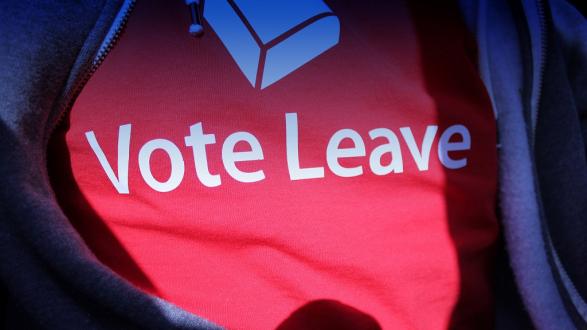In:
Global Beat is your weekly stop for news from around the world. Join us every Friday morning for important stories you should know about.
This week, the United Kingdom votes to leave the European Union; Panama unveils a $3.1 billion canal expansion plan; women’s rights in Saudi Arabia begin to surface; and more.
____________________
Americas
The Panama Canal this week will unveil new locks built under a $3.1 billion expansion plan by Grupo Unidos por el Canal. It is the largest project on the canal since its inception. The expansion became a priority after it was realized the Canal would not be able to accommodate larger cargo ships coming through the Pacific-Atlantic passage. The New York Times, however, has shed some doubt on the locks’ viability and operative nature due to reports of poor manufacturing.
Also check out:
- The next taste of U.S.-Cuban diplomacy will be coffee flavored – Keenan Steiner, Quartz
Central & South Asia
Indian Prime Minister Narendra Modi initiated major economic reforms this week, in a stunning display of economic liberalization, by opening up his country’s economy to foreign direct investment. Foreign companies like Apple and IKEA are being welcomed into the Indian market. Modi hopes the reforms will help ease India’s rising unemployment. The announcement comes on the heels of the resignation of the Reserve Bank Chief, Raghuram Rajan.
Also check out:
- Tamils stranded in Indonesia face "probable torture" if returned to Sri Lanka – Ben Doherty, The Guardian
China & East Asia
North Korea has again incited tension and fear with reports that they set off two missiles on Wednesday morning. Japan is especially worried about the launches, as they occurred over the Sea of Japan. The missiles – appearing to be Musudan intermediate-range – are in violation of United Nations treaties set in place to deter nuclear advancement. Kim Jong-Un said North Korea now has the capability to attack American targets in the Pacific.
Also check out:
- Rooney Mara, Matt Damon, Joaquin Phoenix lead all-star campaign against Yulin dog meat festival in China – Seth Abramovitch, Hollywood Reporter
Europe & Russia
In a stunning and historic referendum, the United Kingdom voted Thursday to leave the European Union, the first country to do so in the bloc's history. A record 33.5 million people voted in the referendum, with 52 percent to leave and 48 percent to stay. The Leave campaign cited the unmanageable free flow of immigration, economic concerns, and sovereignty as reasons for wanting to Brexit. Prime Minister David Cameron, who led the efforts to remain, has resigned his office.
The Washington Post reports that several countries may follow in the UK's footsteps and leave the European Union: Sweden, Denmark, Greece, the Netherlands, Hungary, France, and potentially Scotland. In Northern Ireland, Sinn Féin's Martin McGuinness responded to the news by demanding a referendum on Irish unification. Scotland and Northern Ireland largely voted to remain in the bloc.
Also check out:
- The slow death of the Syria cease-fire brings a hybrid war with Russia closer – Alastair Crooke, The World Post
Middle East & North Africa
A Saudi Arabian delegation visiting Washington, D.C., said that women’s rights in the Gulf nation are purportedly improving. Saudi women have struggled to obtain the right to drive, which, while not technically forbidden by law, is frowned upon by societal norms. Women are also not allowed to go outside without a male guardian, thus restricting their movement in public spaces. In 2013, however, women officials were elected to the Shura Council, a main governing body of the country. In July 2015, a report found that women comprised 52 percent of Saudi Arabian college graduates, often attending university abroad.
Also check out:
- On World Refugees Day, UN says unprecedented 65 million people displaced in 2015 – United Nations News Centre
Southeast Asia & Oceania
The United Nations announced that Myanmar is guilty of perpetrating possible crimes against humanity in its treatment of the country’s Rohingya minority population. Myanmar has been beset by conflict for years between its Buddhist and Muslim groups, and the Rohingya – a Muslim population of 1.1 million – have suffered as a result, being placed in camps and forced to work in conditions not unlike enslavement. Aung San Suu Kyi, Myanmar’s recently-elected leader, declared in May that officials in the country would no longer use the word "Rohingya" to describe its people, and this week she asked the United Nations to no longer use the term. Many Rohingya have decided to flee the nation and have been struggling to settle as refugees.
Also check out:
- The opium bulbs of Myanmar: drug crop or lifeline for poor farmers? – Paul Vrieze, The Guardian
Sub-Saharan Africa
Tensions are rising between Ethiopia and Eritrea as the two countries engaged in conflict this month after 16 years of peace. The clash, leaving hundreds dead, mimicked the fighting that took place during a war from 1998 to 2000. The border lies at the heart of the problem: both Ethiopia and Eritrea claim parts of it to be their own. This week, Eritrea reported to the United Nations Human Rights Council that Ethiopia planned to front a full-scale attack on the tiny nation (which Ethiopia denied), and also said that Western countries like the United States are supporting Ethiopian interests. Eritrea gained independence from Ethiopia in 1991.
Also check out:
- A 700-year-old West African farming practice could be an answer to climate change – Lily Kuo, Quartz




